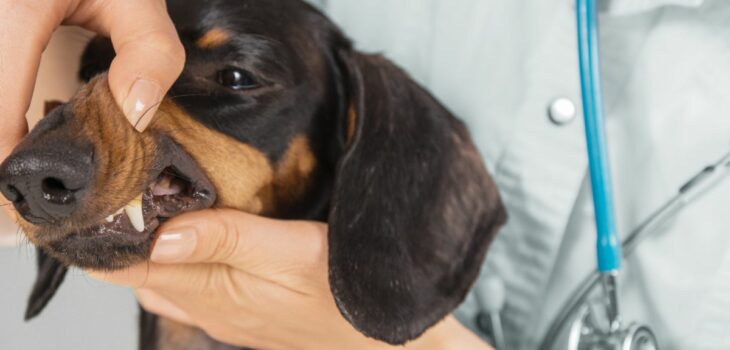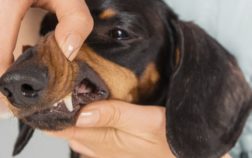Dachshunds are famed for their beautiful white teeth, but just how many teeth do dachshunds have? And what is the best way to care for your dachshund’s teeth? Let’s find out!
How Many Teeth Do Dachshunds Have?
The number of teeth a dachshund has varies depending on whether it is a juvenile or an adult.
All puppies are born with temporary teeth, the same as humans. Over time, these puppy teeth are pushed out as the adult teeth come through.
There are far fewer baby teeth than adult teeth as young puppies do not need to chew much food. The adult teeth are required to last through a lifetime of eating and need to be much more robust and hard working.
Dachshund puppies have 28 puppy teeth, and they then go on to develop up to 42 adult teeth. However, the number of teeth in adult dachshunds can vary, and this is a result of overcrowding in the jaw. Sometimes these missing teeth are considered to be a fault in this breed and dogs with poor dentition should not be bred from.
An adult dachshund with complete dentition will have 22 lower teeth in 20 upper teeth. This should be six incisor teeth in both the upper and lower jaw, and two canine teeth in each jaw on either side of the incisors.
Further back, deep inside the dog’s mouth, are the premolars and molars. There should be 4 premolars on each side of both jaws. The upper jaw has two molars on each side and the lower jaw three on each side.

When Do Dachshunds Stop Teething?
Dachshund puppies are born without teeth, and these will not start to come through until the puppy is three or four weeks old. Open till this age your puppy will only have been drinking its mothers milk and teeth were not required.
The process of teething, where the teeth erupt from the jaw, can take quite a long time. Your dachshund will not normally have all of his puppy teeth until is between three and five months old.
The next stage of losing the baby teeth and developing adult teeth can also take several months. Your dog will not have all of its adult teeth until it is around 8 months old. This means that from the age of 3 weeks up to 8 months, your puppy will be teething – no wonder puppies need to chew all the time!
If you notice that your dachshund puppy breath stinks when losing teeth, don’t panic! This bad breath is normally temporary and will resolve as soon as that stage of teething is over. However, if your puppy seems reluctant to eat or is any pain or discomfort, it is a good idea to get him checked out at your local veterinary clinic.
What Teeth Problems Do Dachshunds Get?
The problem with dachshunds is that many years of selective breeding have led to issues with the size and shape of the jaw and the number of teeth. It’s not in common to find dachshunds with jaws that are misaligned, with either the upper or lower jaw producing further than its opposite. The teeth may also be overcrowded, or there may be some missing.

One of the most common dachshund teeth problems is peridontal disease, which can occur in over three quarters of dogs by the time they are three years old. Peridontal disease is characterized as a build up of tartar around the teeth, causing inflammation of the gums.
It is also common for dachshund teeth to be overcrowded, causing more dental problems than other breeds. This is because the jaw of the dachshund is very small for the number of teeth, and these issues are exacerbated by defects such as a misaligned, undershot, or overshot jaw.
Another common dental problem with dachshunds is that their baby teeth do not always fall out, and your veterinarian may need to remove them.
A buildup of food material around the gums can cause gingivitis, which leads to bleeding gums and bad breath. This contributes to a build up of plaque, and may lead to peridontal disease.
Peridontal disease is a serious concern, as it can lead to bacteria entering the bloodstream. This may lead to serious health problems such as heart disease.
Do I Need To Clean My Dachshund’s Teeth?
Because dachshunds are highly prone to dental problems, it is vital that they receive regular dental checks at the veterinary clinic. Your veterinarian will check your dog’s teeth during the annual vaccination and health check, and may recommend minor treatment to correct any problems.
Make sure to use toothpaste and brushes intended for dogs, as human products may do more harm than good. If you are struggling to get your dog used to this procedure, a good dog trainer or behaviorist will be able to advise you.
Specialist dachshund dogs foods and treats are also intended to keep your dogs teeth in great condition.
Summary – How Many Teeth Do Dachshunds Have?
So, as we have learned, dachshund puppies have 28 puppy teeth, and they then go on to develop up to 42 adult teeth. The process of losing the baby teeth and developing adult teeth can also take several months, and your dog will not have all of its adult teeth until it is around 8 months old. Unfortunately, many years of selective breeding of the dachshund has led to issues with the size and shape of the jaw and the number of teeth.
We’d love to hear your thoughts on how many teeth do dachshunds have! Do you have difficulty keeping your dachshund’s teeth in good condition? Or maybe you’ve got some questions about the best way to help a dachshund puppy that is teething? Leave a comment below and we will get back to you!





